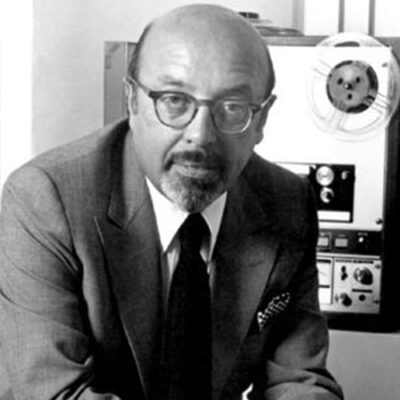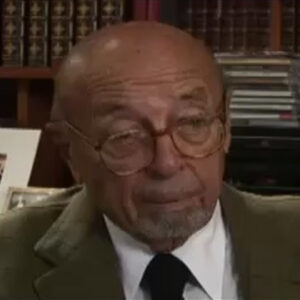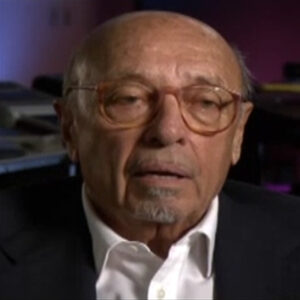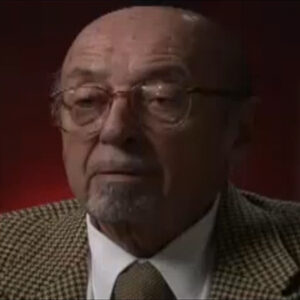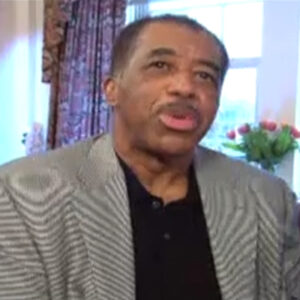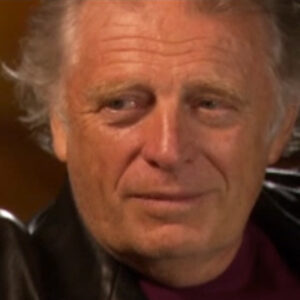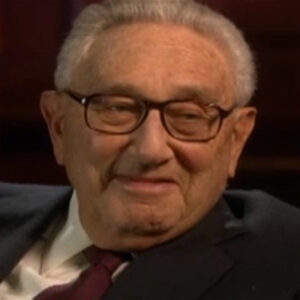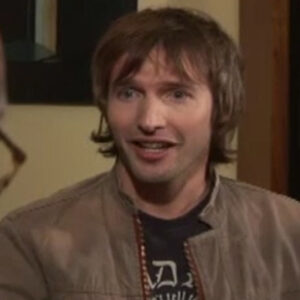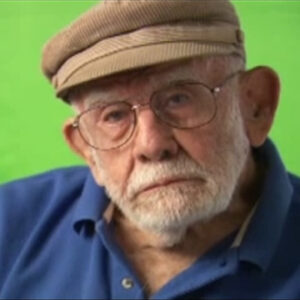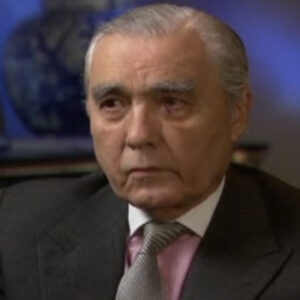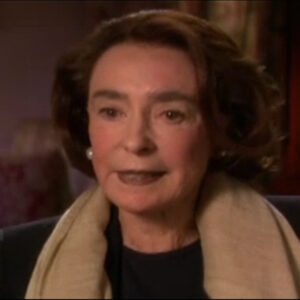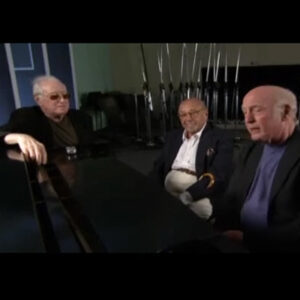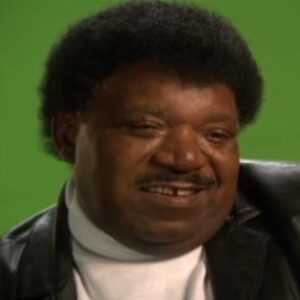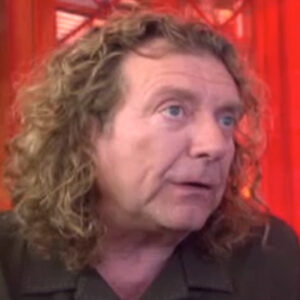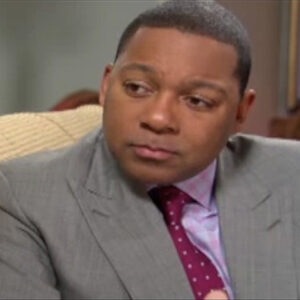M1 Well, when we first started. Atlantic Records, there were many people who would play our records and it was very hard where I know our artists were known and.
M6 And I had a friend in Washington and Hal Jackson, who happened to have one of the hottest shows in town, and he was one of the very first people to ever play in Atlantic Records. And Hal Jackson is a great one of the great people in radio in America. And it was an honor for me to be a friend of his in those days because he became very famous later in life. But in those days, we were both scuffling and and he was a great help to me. And as a matter of fact, I recorded as an instrumental and which Mario Santo Domingo and I, Mario was my dear friend Mario, and I sang a kind of a riff and this tenor sax man playing the solo, which was which we got have to accept to be the theme of this radio program. And it’s a great pleasure for me to be with Hal again today. Thank you have for coming over.
M5 I am so honored and you know what I mean. And just retrace us. I’m so thrilled that even today I feel as close to you as we were back. And you were in Washington? I was in Washington. I had the professional basketball team, the Washington Bears, and then you and I start talking about a record label. And I was a disc jockey as well. And I was just thrilled to death because you got together and made up a theme for me that I have carried for forty five years.
M6 Oh my gosh, I can’t believe I played it that long. Well, anyway, it was it was a it was a wonderful thing that you accepted that and that. And of course you were instrumental in breaking our first big artists. I remember you played Ruth Brown’s records and all of Laverne Baker’s records and all the records we made with people like Al Hebler and the and the Clovers and so on. And many of them were Washington based artists. Right. And where we’re from Washington. And it was great to have that association that you were both now in New York when the big time. Oh, yeah.
M8 But we were in the big time then because I remember you had Red Auerbach was your coach as a basketball team, and I used to come and watch your basketball team train.
M6 And it was something else you play sometimes attorneys arena.
M10 That’s where we played. Is that right there every Sunday afternoon? That’s right.
M6 My gosh. And that that was with very few people. Remember that. But I once I once was a judge at a at a.
M3 And a jazz battle between Jimmy Lunsford’s band and Gene Krupa, his band and pretenders are in that and that, and the crowd was mixed.
M1 It was the beginning of having a mixed crowd, but mostly it was mostly uptown. It was a it was a it was a black crowd mostly.
M8 And the promoters said said Jimmy Lunsford better when I said, listen, Jimmy Lunsford is going to win because you won because sounds like you don’t have to you don’t have to fix it for him to win. That’s correct.
M1 Because Jimmy Lunsford cut the other bad up and down that Lunsford band was too much. Was that to tell you about that wilesmith and all those great people? You know?
M5 You know, it it was always a thrill for me. Yeah. Yeah. Every Sunday when I look over there and you had special seats and you’d come in and not out from the Turkish embassy. And I start relating more and more to the beautiful audience you had on that. You had such an ear for the artists that you were bringing the stars out. And all I had to do was expose it to the world and work the same way with I appreciated your love and support my team, Red Auerbach, who’s a big, big, big man. I took him from the Norfolk Naval Training Station. It was during the war. So he’d come up and, you know, train. But it’s just something no matter how many years I put it on and things I’ve done and the many things you’ve done, I could never forget the relationship I’ve always had with you.
M1 But that was great because, you know, I think that between you and my brother and I and very few other people, I think we start to break the color line right in Washington, because Washington in the 30s was a real Jim Crow. It really was real Jim Crow City. And you remember when they wouldn’t that Marian Anderson sing at the Constitution Hall and she had to sing on the steps of the Lincoln Memorial. Right. Those are important days. I mean, Marian Anderson was not being able to sing in Constitution Hall, made headlines all over the world. And that’s the sort of thing that started to break the color line, I think so. I think mostly happened as a result of the war because the war after the war, they could not let people who had fought overseas come back into it, into the nation’s capital. There was there were segregated. That threat was impossible.
M5 And Nasra was always such a hard working person to make this package that you all had developed such a good thing.
M1 Well, that’s that’s what we loved you. And and, you know, we we we really were dedicated to to bringing good music to Washington. Right. Right. And also to start to open up Washington, to be to be the kind of democratic city it has become.
M5 That’s one thing that I really would like to stress. The efforts you made in order to work on people as people and develop that helped the integration situation. You never back down. You never back down.
M1 And, you know, you have one of the things that really helped us a lot was jazz, because everybody loved jazz. Right. And and jazz. Jazz is the ultimate a area where you cannot segregate white and black people, because even though jazz is basically a black music, jazz it comes from is inspired by the blues and gospel music that started. Right. The kind of music. And, you know, and Louis Armstrong, who is the. I guess the greatest person in the history of jazz without Louis Armstrong, you wouldn’t have had Bing Crosby, you wouldn’t have had Frank Sinatra, Ella Fitzgerald, Ella Fitzgerald as a little girl with Chick Webb’s band was right. I came from Baltimore next door to us, and I remember going backstage to the Howard Theatre. I must have been 13 or 14 years old. And I went backstage and I waited for Alan Fitzgerald to come out of the backstage door and I asked her for an autograph and she told me so, you know, I said, you’re the first person who ever asked me for my autograph. I wonder if that was, I guess, nineteen thirty seven. Thirty seven. Thirty eight, you know. Yeah. And she was just starting, you know. But what what a wonderful person she was. She was incredible singer and. You know, it’s it’s it’s wonderful to have been in a music with someone like you, you’ve done so much for so many musicians, for you’ve broken so many people, so many new artists over the years. You continue to do so. And my hat is off to you. Never stop.
M8 And you look younger. You look younger than anyone as it. You know what? I cannot of course you look young when you are young. When you are young, you look younger, but you always look great.
M1 And it’s just heartwarming for me to see you.
M5 You know, the beauty of the music is the way you were explaining it, how going back to the gospel, going back to the other. But what you did with Atlantic Records and working all of this in and then taking people like Alan and the others and developing a whole stage for everyone. Everybody.
M1 Right. Well, you know, of course, we know we’re lucky to have been able to find such great artists as, you know, as Ray Charles and Aretha Franklin. That’s right. And, you know, all the all the others and and such a great rock artists that we also eventually picked them up to pick them up.
M3 But you know that the thing is that from the very beginning, you know, like we’re making records, singles with Eric Garner, our own Donna.
M4 And you used to play used to play those singles. Right. And they sold he couldn’t read a note. However, he sure could play, man. He could play. I mean, he’s one of the greatest jazz pianist of all time.
M1 Oh, and and that we’ve had we’re lucky to have had so many great jazz musicians on the label after Al Ghanam. We came out eventually when Natsui came with the label we signed up the modern jazz quartet and and a lot of people like you know Eddie Harris and and all that. Coleman Yeah. And you got to, you know you’ve got them and then Coltrane you know this and you know you and Nashville and working with it opened up so many doors.
M5 I used to wonder so often when I would hear great musicians in a club and say, oh, man, you know, I don’t know what you can do about getting recording. I said, but I’ll call Atlantic Records and I’ll ask Ahmet to send someone over to listen to you because you are phenomenal. And that’s the way many of them got their breaks. I mean, if you hadn’t gone to those clubs and listened and pulled the people out, they might have been stuck there.
M1 Yeah, I, I used to you know, I used to go to a lot of those clubs. That’s right. And I especially used to love to go to the baby grand and Nip Nipsy Russell, the late BFC restaurant.
M6 I really miss him. I wasn’t Nipsey Russell was such a great comedian, a great emcee at the Baby Grand, and he helped a lot of young artists bring him in and give him an exposure at the baby grand, which, of course, was right down the street from the Apollo Theater.
M1 Exactly. And that was the heart of of show business at that time. And it was wonderful. But it’s great to see you and. Thank you for everything.
M5 It’s always great to see you and I thank you. Thank you. I. My.
F1 I would love to get the out.
M1 I’m sorry. Why would you? Well, I would love to get a house to the grandkids. I’ll tell you the truth, there were to be I was in Washington, right, and there were two people I knew. I knew how Jackson. Who had a big show, and I knew Jackson loved Michael Jackson, the sure.
M5 Now, Jackson had he was working with the the o God, the big promotion guys. They had the record shops and they would put the big shows with the artists in Griffith Stadium. Right. You remember this was Progesterones Brothers.
M3 Yeah, and and, uh, but anyway, uh.
M4 There’s you and me and, you know, when we first started are our label in New York, we had a very tough time getting, you know, I used to go up and I used to go up and wait outside, Symphony said a studio. And some of the you know, it sometimes took me two or three days to get to say hello. Yeah, give them a couple of records, see if you play them. Then I got to be friends eventually with Willie Bryant. Yeah. Who was very who became one of my great pals the way you were in Washington. He became my pal in New York and he would start playing my records.
M1 And that’s so said. But also eventually. But in the very beginning, we had no but I decided, well, I better see what I can do in Washington. And I first that’s where I first went. That was nineteen for the very beginning of forty seven. Yeah. That’s when I went to look for it for you there because the two big shows were Jackson Low and your and your show when you played records that meant something. And so you were very kind to take my very first releases and put them on the air. I remember you put on the air records by Joe with Johnny Griffin, record by tiny, grimy guys.
M6 I had a girl in Melrose Colbert and that would never happen. Very big. But you played that record too.
M1 And then I made I made that there was your theme song and you continue to give our records a break. And that’s really where we broke our first records were in the Washington area, because also Jackson Lo used to give me a hand. Yeah. Plays on my records. And eventually I got within Ray Willie Willie Bryant. What became my great part, he was the unofficial mayor of Harlem and Willie Bryant, he was a wonderful man. Yeah. And. Yeah, down to the nightclub. Yeah, you know, he had he had a you know, Willie Bryant had a tremendous career. He he played in mambas daughters Ethel Waters as a big Broadway hit in the 30s.
M7 And then after that.
M4 He had no you know, for a black actor. There were no no bookings on Broadway.
M7 And the.
M4 After he was a star and a big hit, he suddenly had nothing. So he started at that time. A lot of big bands were in favor. They were just coming in. You had all the big band. So it started a big band and they had a very good big band for two or three years. And one of the things they used to do, he used to do an imitation of Cab Calloway. So he told me a story of once when he was in when he was in the. In Memphis, yeah. And during the break between two shows, he’s gone for a walk in the neighborhood, the theater, and it was a very rough neighborhood. And you know, well, it was very light. He looked quite right, right. And so he was walking down this this alley and two guys, two young kids jumped up with a with a gun.
M8 And I said, what are you doing here? And they said, give us your money. He said, Wait 20 seconds and said, I’m with a bride. And they looked and said, you’re with a bride, with a bride. And said, is that if you’re with brides, sing like Cab Calloway. So I said, I was in the alley with these two kids with they had a guy that had to hide. Oh, I know. That’s right.
M9 I was really, really good with a bride.
M1 So my Cab Calloway. So that was he told me that story one night while we’re reminiscing about old age. And then after that it became a disc jockey because the big bands were the beginning of the war. Yeah, the big band era was over.
M3 And he became a disc jockey and the. When I started, he was a very big deejay and he was with, uh, the show was called Willy Ray, uh, Willy Brandt and Ray Wylie and Ray. And. Eventually, I met Jack Walker.
M4 Yeah, you remember straight talke, pear shaped that Jack and Jack Walker was the first Atlantic vice president for public relations.
M3 And he, uh, he was a member of our staff and he was a great friend of mine.
M1 And he used to broadcast from a place called the. I mean, that restaurant was a big Italian restaurant up the street and.
M5 Oh, one hundred and twenty Fifth Street and I was called at a big Italian, yeah, because I used to do shows from there too. But Jack Walker was the one who made the base there. And you know what?
M1 I used to go up there and then at like three o’clock in the morning, they close up. The show would be all right. And Jack and I would go somewhere and get some ribs or something in the morning.
M2 So we go into this and said, oh, I said, you know, there’s this place that that, uh.
M3 That movie actor just opened the man who just made a big hit movie and had no other movies. Uh. And he came out in the open to rejoin the. He cut for a second.
M1 Try to come with the first big black star in the movies, The Black, who is the first big black star and the most, you know, uh. He’s still I mean, you know, as you know, I don’t know what what. Who should the Sydney Airport, Sydney.
M5 Great, great.
M1 So anyway, so are you rolling. OK. So Jack Walker says, let’s go over to this. Sidney Poitier opened a rib joint here. Yeah. All right. So we go in there.
M10 I know Sidney who I used to go by there and he served in the ribs and I tried to pay the rent.
M7 So we go in there and and it’s a very small place.
M4 Yeah. It was Sidney and another guy behind the counter there cooking up their ribs. Right. And serving at the counter. And there were like just five or six little tables, you know, and.
M1 So we went in there and we got out and said they got some ribs and everything. And there are very few people very late at night. Oh, yeah, and a couple came in a real like a comedy couple and the and the and the the wife was a big fat and the husband very skinny. And the husband says, oh, says Mabel says, look, it says that’s the famous movie star, Sidney Poitier. Yeah.
M8 And she says movie stars says said if he’s a movie star, how come in Hollywood can I remind you?
M10 I remind you that that evening recently and we had a big laugh and everybody used to go up to this joint up in Harlem and they’d even line up and wait for the ribs. I know he was there. He said that’s what paid the rent.
M1 I know. I know. Because you know what? In those days, there weren’t so many roles. Right. You know, and it was like it was, you know what? We still haven’t come all that all the way over yet, as far as you know. But it’s a.
M5 It was sure was terrible in those days, but we had a lot of laughs, yeah, we had wonderful life there and you know, you think back and I could never total up and take me a long time to think of all the lives that you have touched and and even the record company, Atlantic as such and where they have gone from there. It’s a beautiful thought. And, you know, I sit and think about it often. You never turned your back on any artist.
M4 Well, I hope not, but I sure am glad to see you and thank you again for all your help all these years. We still see the best. Thank you, man. All right.

